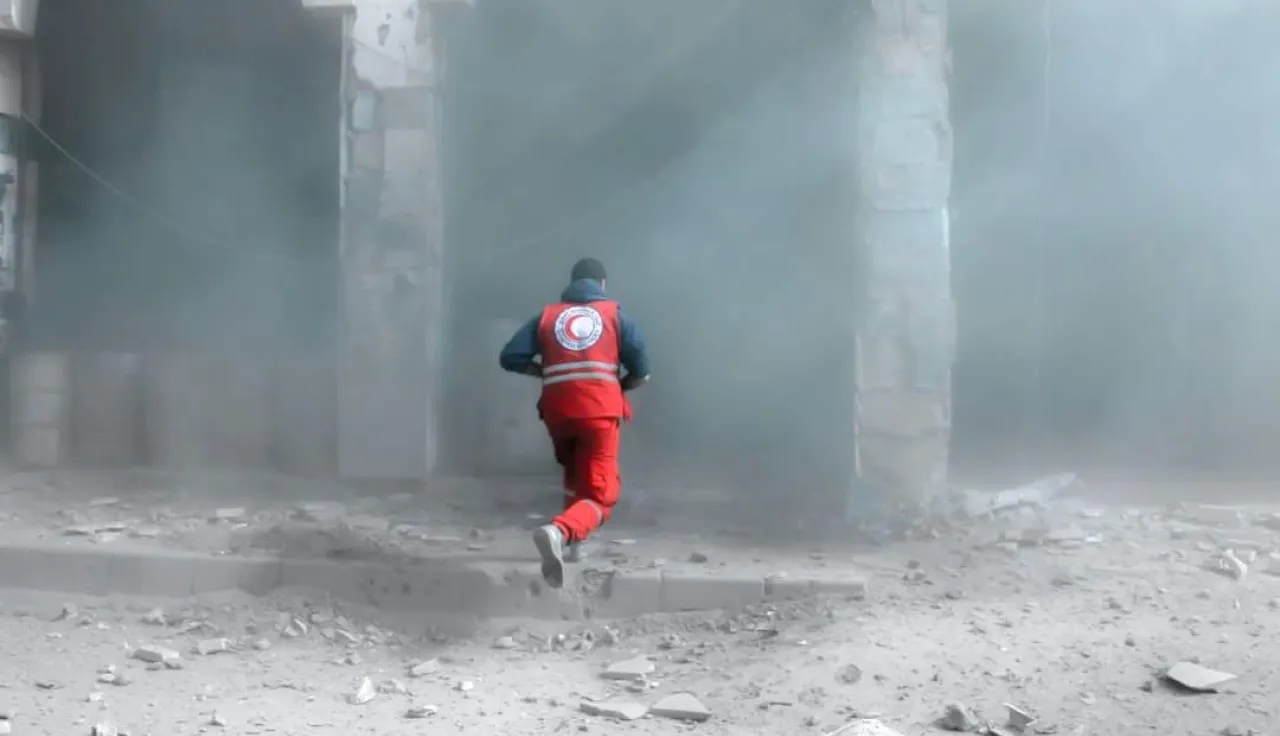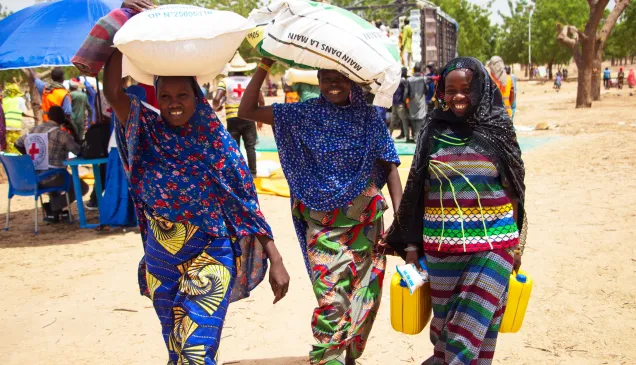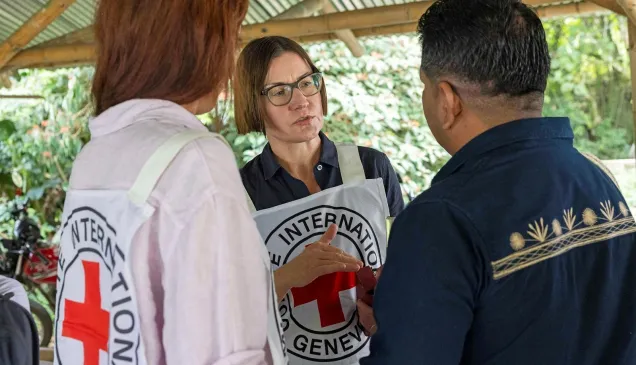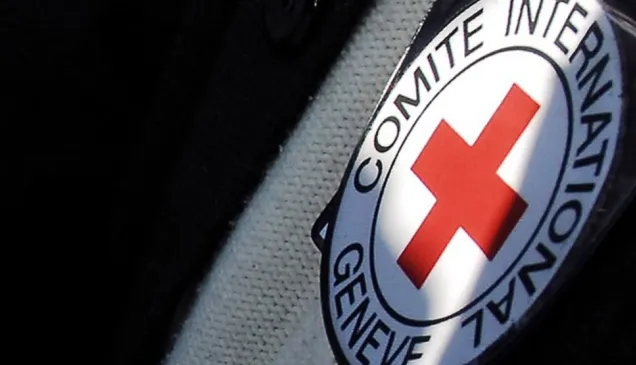Excellencies, ladies and gentlemen, colleagues and friends,
Welcome to the 33rd International Conference of the Red Cross and Red Crescent, a unique platform for our Movement and the High Contracting Parties to the Geneva Conventions to come together and shape the future of humanitarian action.
I'm not alone in offering you this warm welcome – delegates have received messages from the school children of Geneva, who thank the Red Cross and Red Crescent for their work around the globe, others talk about their dreams for a world without poverty, disease, hunger, war and disaster. They call on us to 'heal the world'.
When you are eight years old, the opportunities to help the world seem endless. But as the years pass, ambitions are curtailed. During this Conference, I encourage you to reflect on these words of encouragement and aspiration, not out of naivety, but to focus on people in crisis who are at the heart of our discussions – to imagine what is possible, to go beyond politics and to focus on the practical steps we can take.
At Sunday's Council of Delegates, the Movement advanced on some priority issues that substantively influence the Movement's focus for the coming years:
We committed to bolster trust and integrity and to strengthen our accountability to affected communities. Specifically, the Movement adopted a clear Statement on Integrity; Movement-wide commitments on Community Engagement and Accountability; and a resolution to build transparency and promote gender balance in the Standing Commission.
We took some important decisions on addressing particular vulnerabilities, in the areas of mental health and psychosocial support, family links, migration and internal displacement.
And we also examined better ways to collaborate as a Movement, including a renewed commitment to a revitalized process aimed at Strengthening Movement Cooperation and Coordination and a lively discussion on how to adapt structures and processes to better reflect the roles each one of us can and should play in a Movement fit for the future.
I am also pleased to inform you that the Council of Delegates found consensus charting a course forward for the Movement's accompaniment and monitoring of the implementation of the MoU between Magen David Adom in Israel and the Palestine Red Crescent Society. We will invite the Conference to endorse this path forward on Thursday.
Let me be very frank with representatives of States: what was important to note in yesterday's Council of Delegates was not the progress on this or that issue – rather it was the atmosphere of concern, where genuine frontline experience from all parts of the Movement came to surface:
- The inhumane effects of some of the migration policies we deal with;
- The toxic atmospheres in societies and the deep impact of crisis and conflicts on the mental health of populations and helpers;
- The infringements on neutral and impartial humanitarian spaces;
- The flouting of IHL by States and other actors in contemporary battlefields;
- The weaponization of humanitarian data in the context of combat operations, counter terrorism and public order policies of governments.
I list these not as accusations, but as areas of genuine concerns, which have to be brought to the table in an open discussion with the aim to renew the special relationship between States and the Movement.
This international conference is unique: its origins are built on the premise that in times of disaster, violence and conflict, in contexts of underdevelopment and other global challenges, when despair and devastation are greatest, people's lives could be saved and suffering alleviated precisely through the special relationship between States and the Red Cross and Red Crescent Movement.
The special relationship is built out of necessity – in times of crisis, neither States nor civil societies are sufficiently equipped to deal with these issues on their own, but rather need each other.
Therefore, from the very inception of the Movement, we had to deliver on a vision: built on durable relationships of trust, on principled humanitarian action, and on a humanitarian space protected from political intervention.
This special relationship has been enormously effective – at the moment of each of the world's major crises, the Movement has been on the ground. Working with States, we have sought to mitigate against the impact of war and violence, we have brought a humanitarian voice to political debates, and we have mobilized civil society through a huge network of engaged volunteers.
This year, the centenary of the Federation and the 70th anniversary of the Geneva Conventions are symbols of the durability of our unique contract. Congratulations to the Federation and thanks to all States for their continued engagement and support.
While recognising both the enormous impact and potential of this special relationship, this cooperation has not always been appreciated at its right value, fostered, nor integrated in political decision-making.
Today, I make a call for renewed efforts from all of us, to re-energize our relationship in the face of the complex humanitarian crises of today.
I am concerned about the fading political support – and funding – for neutral, independent and impartial humanitarian work. Humanitarian work is increasingly used for political purposes, access is denied to certain groups in need and international legal obligations are shirked.
Likewise, I self-critically acknowledge that the privileged situation of the Movement in certain contexts and countries, has not always translated into services at scale and speed expected by States and societies when emergencies strike.
When our special relationship is weakened, the effect is always the same – less aid and protection for people in need and the creation of dangerous precedents that reduce neutral, impartial and independent action.
The enormous and complex crises of the world demand our best response. The women, men and children who face a daily struggle to survive deserve our best response.
From protracted and urbanized conflicts, climate shocks, pandemics, displacement and migration, threats to humanitarian space, unrestrained weapons flow, violence, crime, inequality, corruption and failing governance... the list seems unlimited.
Already huge numbers of people are affected. Conflict, violence and disaster will be a key trend in many societies and in international relations in the years to come. And we expect these crises will grow only more complex, with climate change, more numerous armed groups, overlapping forms of violence.
In the absence of political solutions, wars are protracted, some lasting decades. More people are affected, for longer periods, sometimes even for generations.
Urban battles feature prominently, causing large-scale destruction. Explosive weapons with wide areas effects are used in densely populated areas causing unacceptable harm to civilians and their cities.
As wars destroy whole systems critical for civilian survival, as people are displaced for 1, 2, 10 or 20 years, new needs are created. In these 'long-term' emergencies, beyond the basics of food and shelter, people also need electricity, water, health-systems. What we think of as 'emergency needs' is shifting. And so must our response.
Vitally, we must engage with communities affected to understand - on their terms - what they need, what will best set them on a path not of dependence, but of self-reliance.
Too often aid, and humanitarian assistance first, has become the inhibitor rather than the promoter of autonomy; we need to change course and build pathways to independent, responsible and self-determined lives.
We must respond to the invisible needs – the mental health and psychosocial needs of people who are survivors of deep trauma. Entire communities and individuals are suffering in silence, overwhelmed by stigma and lack of appropriate support.
This hidden pain demands our attention as much as physical needs, and I was encouraged by the overwhelming support of the Council of Delegations to advance on this issue. I was equally encouraged to see the support for the suffering of families of missing people who appeal to the Movement for help.
We must also be alive to both the benefits and risks of digital transformation. Rapidly developing technologies are forging new frontlines in cyberspace, as well as creating new ways to fight, for example autonomous weapon systems and other remote means of warfare. It is critical that humanity is preserved in these new frontiers, and that humans remain in control of decisions to use force.
Digital tools are also transforming even the oldest humanitarian services. The Restoring Family Links programme is rooted in the experience of two world wars and conflicts around the world and has been reuniting families for 150 years. The combined power of the Movement's grassroots and global networks, with the strong support of States, makes this possible.
Today we are focusing on increasing digital accessibility and leveraging new technologies to improve the search, another ambition clearly stated in the Movement Strategy on Restoring Family Links adopted at the Council of Delegates.
It is critical that people who are often in very vulnerable situations need to be able to trust how their personal data are being used.
Indeed, in all that we do, great trust is placed in our hands.
Trust is our license to operate: it means we can cross the frontlines and reach affected communities, it means we can act as a neutral intermediary to broker aid deliveries, it means faith that donor funds will be wisely used, and it means that we must ensure the integrity of our institutions.
It also means that we remain accountable to the communities we work in. This is not lip service, but requires a true engagement with people affected by crisis, listening to their needs, expecting to be challenged.
Our workforce must also reflect the diversity of the populations we serve. Diversity and inclusion are imperatives of our world today. They are not optional 'nice to haves'. In particular it is vital that inclusive practices extend to leadership positions, and that commitments on women's leadership are not just made, but delivered – and quickly.
Of enormous concern to many in the Movement is the instrumentalization and politicization of humanitarian work. We are seeing more and more States tightening the noose around the space for neutral, impartial and independent action.
Humanitarians are denied access to civilians and detainees; the safety of humanitarian workers is not guaranteed; and the delivery of aid is restricted under the pretext of artificial bureaucratic obstacles, sanctions and other restrictive measures.
We see that although States hold legitimate security concerns, counter terrorism measures can also restrict humanitarian action. While steps have been taken in international fora towards practical solutions, it remains important to renew the common understanding between States and the Movement on how to operate in such difficult contexts.
Importantly, in this 70th anniversary year of the 1949 Geneva Conventions we are called on to champion the protective power of international humanitarian law.
The Geneva Conventions represent one of the greatest achievements of inter-State cooperation: they are among the very few international treaties that have been universally ratified, not least because they reflect universal values of ethical behaviour and human dignity.
Throughout this milestone year we have seen States make strong affirmations and actions to respect and ensure respect of IHL.
We've seen parties to conflict taken measures in many instances to ensure IHL is respected in their military operations – such as cancelling or suspending attacks because the expected incidental civilian harm is deemed to be excessive. And we've seen States levering their support to conflict parties to encourage respect of IHL.
Despite the numerous positive efforts, outrageous violations still continue. It is clear that we must do more to ensure respect for these laws. When the integrity of the Law is violated, we are all violated.
The ICRC observes that in many of today's military operations –either because of outright and deliberate violations, or because of expedient interpretation of the law – the protection of civilians is under threat. In conflicts where there is a disregard for the rules, the consequences are devastating not only for individuals and families, but also communities and the stability of entire regions.
It is a dangerous road to take: if States interpret the fundamental rules of IHL with expedient elasticity or question norms that have long been accepted, they risk setting alarming legal precedents and enabling future actors to inflict harm beyond what is militarily necessary or tolerable to humanity.
There is no doubt that the modern battlefield is complex. The report on the Challenges of contemporary armed conflicts produced for this conference raises critical issues around the protection of civilians, urban warfare, new technologies, the rise of non-state armed groups, the relationship between climate change, conflict and the natural environment. We hear the concern of States and their militaries that practices of adversaries force more diligent interpretations of the law. What we see and fear though is how this is undermines – and we are sawing the very branch of the tree on which we are all sitting.
The Challenges Report also outlines the case for ensuring the protections of the law extended to often overlooked groups of people – people with disabilities, internally displaced people.
And that protections are based on people's diverse needs and capacities. Younger people experience war differently from older people; women from men; people with disabilities and people without disabilities.
Experience tells us that when it comes to violations of IHL, it is not only the knowledge of the law that counts, but the translation of that knowledge into behaviour.
As the trend towards allied and partnered warfare only increases, it has become urgent for States to look at how they can influence their partners to ensure civilians are better protected.
In the face of these new challenges, the ICRC is working with States on the application of IHL in contemporary battlefields and we appreciate the ongoing constructive and open dialogue with many States on these important issues.
During this conference – and having closed the process on strengthening IHL last March – the ICRC's focus is on practical implementation of IHL in the field, and in domestic systems. We also call on states and National Societies to agree on the resolution on bringing IHL home, and to adopt all measures to fully implement IHL.
I will conclude by offering you words of encouragement for this conference.
If we are to 'heal the world' as is asked of us by the youngest generation, it will be done through our combined efforts – through a re-energised relationship of States working with the components of the Movement.
This is our opportunity to take pragmatic steps forward, this is our opportunity for a greater impact.
As we search for solutions, we must always keep the people who seek our aid and protection at the heart of our discussions and of all our actions.




